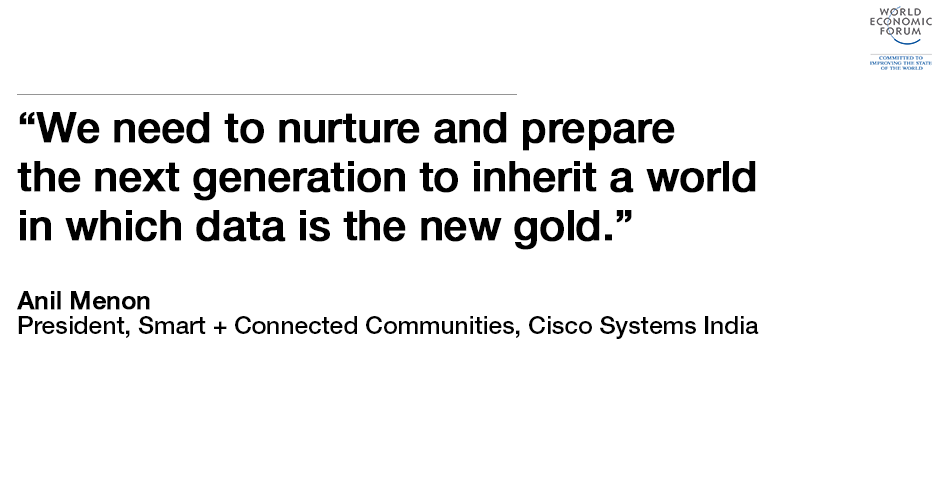Q&A: Four questions on the future of cities


Get involved with our crowdsourced digital platform to deliver impact at scale
Stay up to date:
Cities and Urbanization
From Kansas to Bangalore, cities are getting smarter. Cisco’s Anil Menon talks to us about the future of urbanization, as part of a series of interviews for our Summit on the Global Agenda in Abu Dhabi.
The world has never seen such an intense period of urbanization: is it sustainable on a global level?
Until we find and settle another habitable planet, we must find a way to make urbanization sustainable. The shifts are real and people are moving into cities to find work and take advantage of services. So, the challenge exists to support city leaders and municipal agencies in finding more efficient ways to deliver the kinds of services citizens need and at the same time be able to manage resources effectively. Additionally, country leaders are recognizing that digitization can support citizens on an even broader scale beyond cities. They are looking for ways to extend reliable power and connectivity to enable adequate healthcare, education, water and waste management and other such building blocks for sustainability into rural areas. We need to nurture and prepare the next generation to inherit a world in which data is the new gold – and make citizens of every country able to become productive and contribute to their full extent of their potential. What are your top 5 innovations for making cities smarter?
What are your top 5 innovations for making cities smarter?
- Establish a city-wide platform to support data sharing across industries and sectors.
- Deliver wifi to support communication, use of data and citizen engagement.
- Work with city leadership to drive the digitization of municipal services.
- Provide a portfolio of smart solutions including parking, lighting, traffic, safety and security in a way that corresponds with the city’s priorities.
- Encourage local partners to work together on a digital platform, including entrepreneurially developed apps tailored to each city. Tap a global stream of data to inform decisions that make each city vibrant and competitive.
Can you name one city in the emerging and developed worlds that has excelled in terms of smart city innovation?
Each city brings a unique combination of qualities and requires a tailored approach to getting smart, so it’s difficult to pick just one. In Europe, Barcelona and Hamburg are distinguishing themselves with ground-breaking approaches to becoming more efficient while simultaneously preserving the distinctive characteristics of each city. In the US, Kansas City is bringing together a consortium of powerful partners to work on a whole new arsenal of solutions to the city’s challenges. In Asia and the Middle East, Dubai, Bangalore and Adelaide are making dramatic shifts in how they operate and deliver services to their citizens. It’s a very hard request to pick only one…But perhaps because the US has been a bit slow in adopting smart city approaches compared to other parts of the world, then Kansas City, our newest “lighthouse city”, would be that city.
What innovation will have the greatest influence on cities in the coming decade?
It is difficult to identify a single innovation—such as self-driving vehicles or personal health dashboards. Rather it is likely that the impact of many innovations taken together—both global and local—delivered via an intelligent network will move us to a new plane of understanding about ourselves, our communities, our cities and the world. Implementing and maintaining a fully integrated intelligent network citywide and tapping the know-how of both global and local domain experts will offer a new marketplace for services and transform the way our cities are managed. It will also continue to stretch our definition of “community”, based on new sets of criteria, and allow us to understand and experience people, places and information that we may never have been able to engage with otherwise.
If you could make one thing happen in the next twelve months, what would it be?
Provide a way for more cities around the world to experience the benefits of sharing information more effectively between agencies and with citizens.
The Summit on the Global Agenda 2015 takes place in Abu Dhabi from 25-27 October. The report Top 10 Urban Innovations is available here.
Anil Menon, President, Smart+Connected Communities, Cisco; a member of the World Economic Forum’s Global Agenda Council on the Future of Cities
Image: A tourist boat passes on a canal in Amsterdam, December 6, 2013. REUTERS/Michael Kooren
Don't miss any update on this topic
Create a free account and access your personalized content collection with our latest publications and analyses.
License and Republishing
World Economic Forum articles may be republished in accordance with the Creative Commons Attribution-NonCommercial-NoDerivatives 4.0 International Public License, and in accordance with our Terms of Use.
The views expressed in this article are those of the author alone and not the World Economic Forum.
The Agenda Weekly
A weekly update of the most important issues driving the global agenda
You can unsubscribe at any time using the link in our emails. For more details, review our privacy policy.
More on Cities and UrbanizationSee all
Victoria Masterson
April 17, 2024
Victoria Masterson
April 12, 2024
Victoria Masterson
April 11, 2024
Sam Markey and Andrew Watkins
April 5, 2024
H. Kit Miyamoto, Olivia Nielsen, Ommid Saberi and Guido Licciardi
March 27, 2024
Victoria Masterson
March 26, 2024






